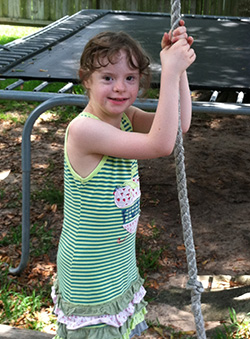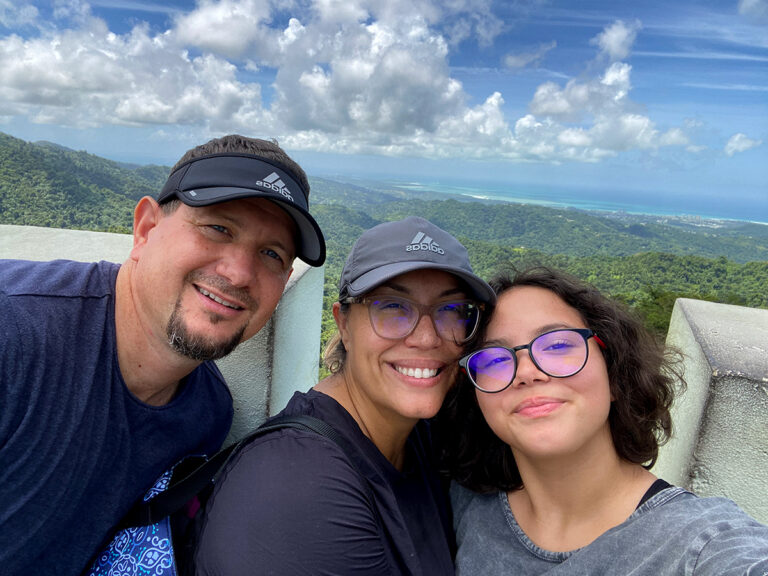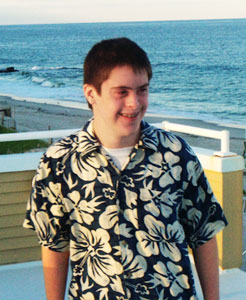Attention Deficit Disorder: “Joshua”
As told to Iliana Clift by Joshua’s Mom
When Joshua was five and the time that he should start kindergarten was fast approaching, I agonized over placing him in a formal school setting. He was very active and did not like to sit still. He would not sit down to eat, but preferred to stand at the table, practically running in place while he ate. He was fidgety and impulsive. He was frequently irritated over the most insignificant thing and would flail around in frustration. Having a fall birthday meant that he turned five just after the school deadline, so I used that year to work with him at home, hoping to get him ready for school.
But Josh wasn’t interested in learning letters and numbers; he just wanted to constantly play, run, jump—anything but sit still. No matter what I tried, he wasn’t retaining anything. I was afraid traditional school would not be a good fit for him.
One day while talking with a friend, who happened to be an elementary school principal, I described Josh’s behavior. “It sounds like he would be sitting in front of my office a lot,” she said. That was exactly what I was afraid of. Knowing that she understood what I was talking about wasn’t helpful, though; I needed solutions.
I began studying various educational philosophies and looking for an appropriate school for my son. Finally I settled on a nearby Montessori school and Joshua did well there, especially in learning math. Because the Montessori method allowed for movement in an open multi-age classroom where children can choose from a variety of learning activities, a lot of Joshua’s issues were tolerable. Unfortunately, the school only went up to 3rd grade, and once again I was faced with the difficult dilemma of Josh’s schooling.
After much soul-searching, research, and prayer, I brought Joshua home for school and redoubled my efforts at creating a positive, but structured parenting environment. Since I had taken Montessori training and had been working at the school, I was excited about continuing the same philosophy at home. Nevertheless, the next two years were an exercise in futility. Yes, we had some fun together from time to time, but mostly we struggled. If I required that Joshua do something he didn’t want to, he would throw an intense tantrum, such that a simple five-minute handwriting assignment would turn into a 20-minute wailing and screaming fit. He would do math in his head, but would stubbornly refuse to write anything down. I spent a lot of time nagging, cajoling, bribing, or withholding privileges.
As Josh grew in years, he continued to be very childish and unpredictable in his attitude and behavior. Like a firecracker, he would burst with anger and lash out at others, even physically at times. He was extremely impulsive and, worse, he was becoming more and more violent. Thus, when he was 11, I sought the help of a well-known neuropsychologist, who, I hoped, would not just push medication, but offer specific advice on what to do with Josh—how to raise him, how to teach him, and how to live with him. How could we help him become a productive member of society? How could we help him overcome his anger issues so he wouldn’t end up seriously hurting someone? How will he keep a job or have satisfying, close relationships? Or was he going to end up destitute, homeless, or in jail?
The evaluation at a prominent learning and behavior center was an all-day event that essentially established that my child had some significant issues. The doctor slapped Joshua with a myriad of labels: ADHD-Combined type, Oppositional Defiant Disorder, and Adjustment Disorder with Mixed Emotional Features. Indications were that Joshua might also experience developmental reading, mathematics and written language disorders. The recommendations were to return Joshua to a professional school setting, get a tutor for him, put him on a medication, and involve him in exploratory psychotherapy.
I felt like I had totally failed my son. Without using the words, I felt like the doctor was telling me that Joshua was a mess, that I was doing a horrible job homeschooling him, that I was neglecting his emotional development, and that Joshua had not progressed academically. To fix that, we were to put Josh in the hands of the “experts.”
Going home that day I felt devastated. I knew that homeschooling on my own wasn’t working. With Joshua’s emotional instability, I didn’t know when to push and when to hold back. I knew I needed help, and I felt my only option was to follow the recommendations we had been given. In utter desperation, I picked up the phone book and started listing all the schools within driving distance, both public and private. My plan was to describe the issues my son was dealing with and ask if they could work with him. Then, at the end of the school listings, I saw NACD’s listing stating that they help those with ADHD and learning disabilities, as well as other issues. I immediately investigated this option! As I read through the information on NACD’s website, I was relieved that there was something available that focused on a child’s individual needs and could improve concentration and behavioral issues without medication.
After receiving and listening to NACD’s introductory CDs, Guide to Child Development and Education, I was impressed with the idea of organizing the brain. Could that be the source of Joshua’s problems? I couldn’t wait to learn more. Even though I had an evaluation scheduled for Joshua, I attended a homeschool convention just so I could meet with an NACD evaluator who was going to be there. The visit with Sara was very reassuring and I began to be encouraged.
Unlike the previous neuropsychological evaluation which had left me feeling that Josh had a heap of insurmountable, incurable disorders for which medication was the only option, the neurodevelopmental assessment done by NACD made me feel that Joshua’s problems could be overcome and were actually a rather mild case for NACD. Sara designed an individualized program that addressed Josh’s specific underlying problems that caused his inability to sit still, concentrate, and regulate emotionally. I didn’t understand how the program pieces would help Josh, but this became our new homeschool program, and I was determined to implement it fully. Surprisingly, Joshua cooperated. It helped that each activity was short in duration and high in intensity and that I could always respond to his “why” with “because Sara said so.” The previously incredibly stubborn and belligerent child was becoming more and more cooperative.
After a month of working with Joshua on program, I had my two younger children evaluated. Again, Sara designed individualized homeschool programs for each of them addressing their educational and developmental needs.
Daniel would have done just fine in public school and was learning well at home, but I took NACD on their assurance that typical children can become exceptional. He began the NACD program when he was nine years old and going into 4th grade. Over the last three years he has improved five grade levels in math and seven grade levels in reading comprehension. Within two years of starting NACD, Daniel had maxed out on the standardized reading comprehension test. He is self-motivated, reads a lot, and loves to write. Recently he told me that working through his NACD program helps him picture his stories and put them into words, something that is clearly significant to him. He is currently enrolled in an online school and is excelling academically.
Rebekah was eight years old and in 3rd grade when she started NACD. At her first evaluation she tested at a second grade level in math and word recognition. Three years later, she is doing math at a sixth grade level, her word recognition is at nearly an eighth grade level, and reading comprehension is even higher—tenth grade level. Although reading was challenging for her at first and she avoided it at all costs, she now loves to read and needs to be reminded to do anything else. Still working through some speech issues with Lori, the NACD speech patholgist, Rebekah is making great strides developmentally and cognitively. I credit this to the individualized, focused input she is receiving through her NACD program.
Naturally, since Joshua’s were the greatest needs, the most profound changes we have experienced as a result of implementing the NACD program have been with him.
When Joshua was first evaluated by NACD at the age of 11, he scored at a sixth grade level in word recognition and reading comprehension, but only at a third grade level in math. After only four months on his NACD program, his reading comprehension jumped to a ninth grade level and math to fifth. He continues to gain academically and as of his last assessment, he is close to an eighth grade level in math, 10th grade level in word recognition, and he maxed the standardized reading comprehension test. It is the specific, personalized teaching, guided by NACD, which has produced these incredible results—with no medication. When I asked how NACD has helped him, Josh told me, “My thoughts used to be really scrambled, but I can think clearly now.” What a gift NACD has been to him, as well as to our whole family!
Without NACD, I feel that Joshua would still be lying on the ground kicking and screaming. Instead, he is a 15-year-old young man, who is much calmer and in control of his emotions, who responds to situations appropriately with few reminders, and who is aware of other people’s feelings. He is quiet and reserved, participates in various activities, such as scouting, camping trips, and karate. He is more compliant and reasonable, and his attention and behavior have improved dramatically, both at home and in other settings. It was nice to receive feedback from his scout leaders as they noticed significant improvements within the first year.
After that disheartening meeting with the neuropsychologist who pushed medication, I felt no hope that Joshua would ever be able to live on his own. This specialist, who no doubt had given similar recommendations to numerous other parents, pressured me to put my child in a private school and let the “experts” deal with him. NACD, on the other hand, empowered me to be the real expert on my child—after all, no one loves and knows him as well as I do. While Josh still has challenges, I am now confident that my child is growing into a responsible, contributing adult and a successful human being.
I’m so glad I opened that phone book and came upon the NACD listing. Although our difficulties are minor compared to what some NACD families face, honestly, I would have been lost without NACD. What they did for Joshua—what they are doing for all my children—is proof that every school, every counselor, should know about NACD.




